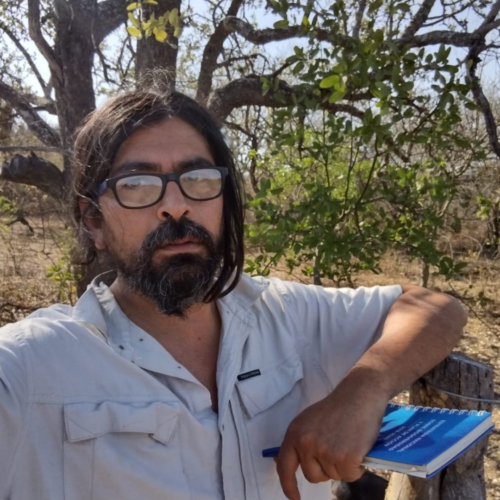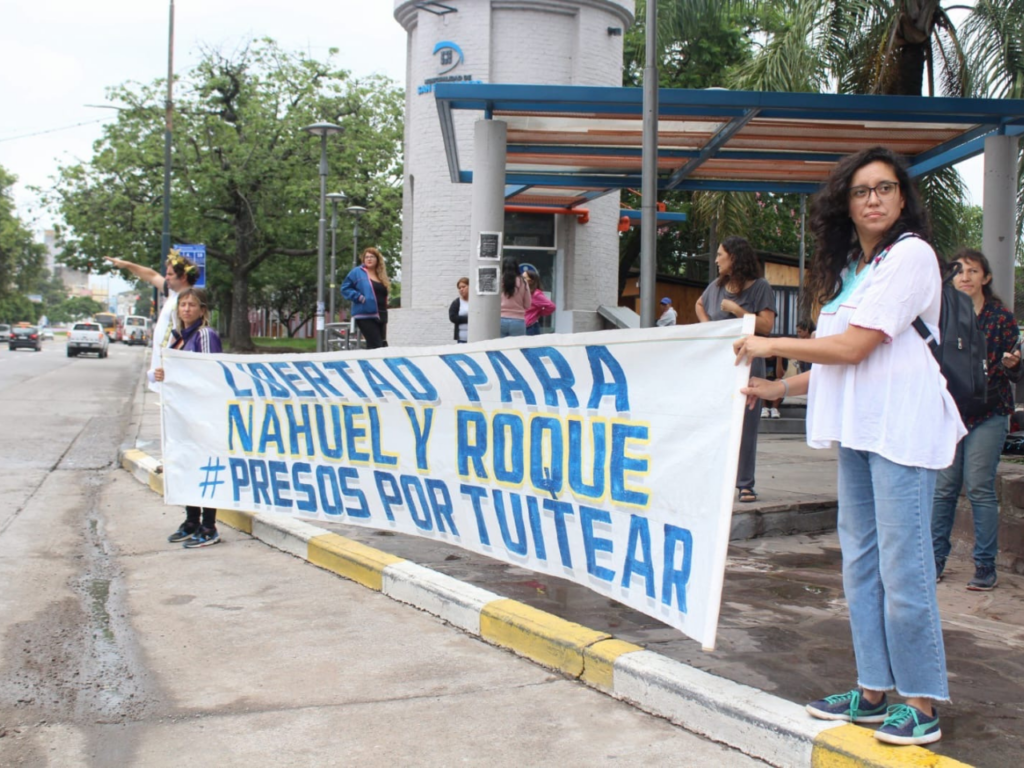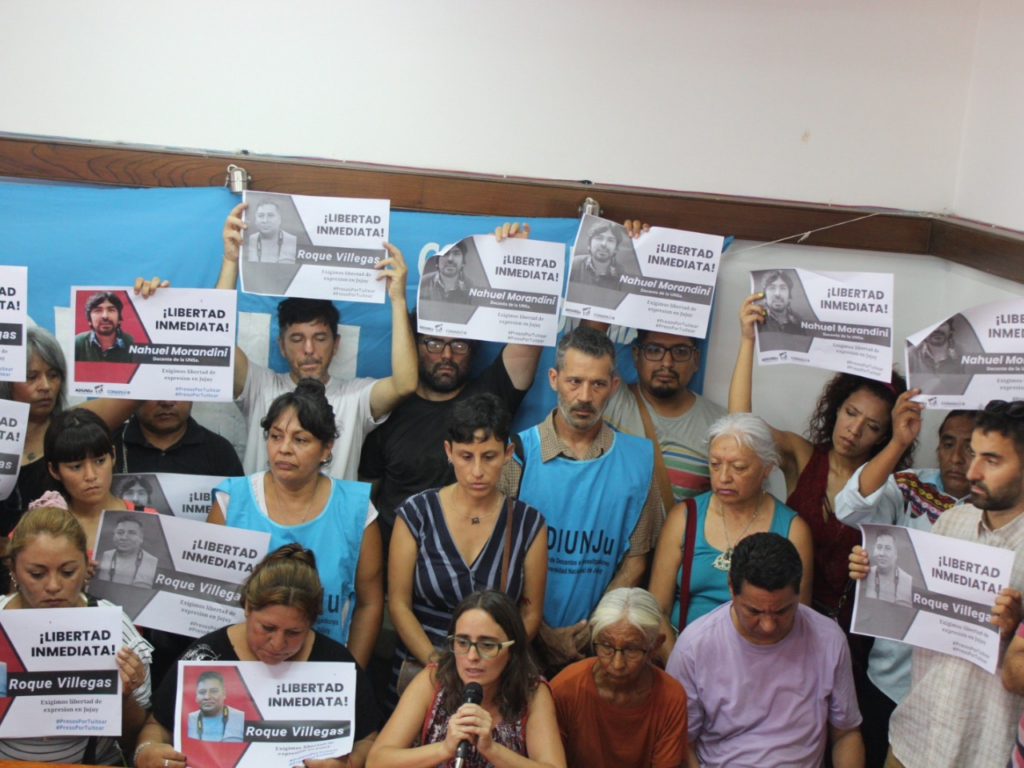College professor jailed for posting a joke about government official on X, Amnesty International speaks out
A rumor was circulating in my province that the wife of the former governor cheated with a famous singer. I came up with a witty comment, which I found amusing, and posted it on my X account.
- 2 years ago
April 16, 2024

JUJUY, Argentina — For nearly two months, the authorities in Argentina separated me from my family and confined me to prison for making a joke on X, formerly known as Twitter. My jest about a rumor of infidelity involving the former governor Gerardo Morales was all it took to be arrested and face judicial and political persecution.
After my imprisonment and the humiliating, unjust treatment I endured, they released me, but I face charges that could lead to an eight-year prison sentence. It feels incomprehensible and frustrating to be in this situation. On the other hand, the ordeal allowed me to raise my voice to expose a distressing abuse of power in my country.
[Amnesty International is demanding, on behalf Nahuel and another Argentinian citizen, that all charges be dropped and that the Argentinian courts honor International Human Rights Law protecting the right to freedom of expression. Amnesty International cited Argentina’s obligation to “respect, protect, and guarantee human rights.”]
Read more crime & corruption stories at Orato World Media.
Imprisoned for a joke on X
On December 26, 2023, I lounged on my sofa at home while swiping through social media. A rumor was circulating in my province that the wife of the former governor cheated with a famous singer. I came up with a witty comment, which I found amusing, and posted it on my X account. As a fairly inactive social media user with practically no followers, I never expected any significant reaction to my post.
In the days that followed, I forgot all about it and carried on with my life as usual. However, in early January 2024, I began noticing unusual activity in my neighborhood. One evening while returning home, I found a young man entering my property. When I approached, he couldn’t tell me who he was looking for. The encounter felt odd; people never roamed around that area.
Upon mentioning this to my neighbors, they informed me that people had been taking photos of my house. Someone even asked a local bricklayer about me. Then, on January 4, 2024, while working at home, my doorbell rang. My partner answered the door and let a woman dressed in athletic wear inside. She said she needed to charge her phone.
Once in the house, she asked for me. She identified herself as a police officer and said they were looking for me. Then, two individuals emerged from an unmarked car and, when asked, refused to identify themselves.
They showed me a notification which required me to report to the complex crimes unit. “If you don’t come,” they said, “we will take you by force.” I felt I had no choice but to go. However, I insisted on driving myself.
Judge deems accusations valid and orders a 60-day detention
Despite my efforts to make sense of it, I could not comprehend what was happening. For a moment, I thought maybe someone committed fraud using my name. When I arrived at the station, my lawyer, whom I had contacted on the way, awaited me. Thanks to him, my wife stayed up to date with what happened next.
As soon as I crossed through the door, the authorities demanded I hand over my cell phone. From that moment, I lost all communication. With no information about why they detained me, they locked me in a cell. The next day they took me to a trial, where I heard a series of implausible and ridiculous accusations against me. To my astonishment, the judge deemed them valid and ordered my detention for 60 days. They transferred me to the penitentiary service, alongside already convicted prisoners.
Fear took hold of me. As a university professor, this arrest completely disrupted my daily life. I never went to prison before, and I suddenly found myself confined to a maximum-security wing, locked in a windowless room with a wet concrete floor to keep the space damp. At one end, the authorities turned on a spotlight at their discretion, sometimes blinding me or plunging me into deep darkness for long stretches of time.
The guards refused to let me keep the glasses I used for years to see properly. They forced me to strip naked every time the police staff appeared. They made me strip if I wanted to go to the hallway to get water or when I had to wash the basin where I went to the bathroom. I lived through these torturous conditions.
I fully understood I had done nothing to be arrested for
In jail, I lost all sense of time. In the dim light, without my glasses, sight offered me no information. I relied solely on sounds. Doors and alarms indicated the presence or absence of police officers. The meal schedule included breakfast, lunch, snack, and dinner, which gave me some clue of the time of day. I practiced breathing exercises and yoga, which helped me relax.
When I found an old magazine with already-completed crosswords, I tried to read the words written in large letters. Repeating them out loud helped me avoid the darkness of my thoughts. I fully understood I did nothing to be there. Yet, the thought of my two daughters and wife suffering because of all this weighed heavily on me. The idea of their sadness filled me with deep anguish.
On January 6, 2024, I finally got the chance to speak with my family. Thanks to a social service worker, I had five precious minutes on the phone. Hearing my voice, my wife could not contain her tears. “Don’t worry, I’m okay,” I assured her. It wasn’t until I was transferred to another ward that I could talk to my daughters.
Full of concern, they asked if I was sad and if I had eaten. My heart broke into a thousand pieces, hearing their voices, yet unable to hug them. The stories of their little adventures brightened those shadow-filled days, even if just a little.
Father tells daughters he was arrested for a joke on X
Weeks later, they finally allowed me to receive visits. My daughters peppered me with questions the moment they saw me. “Do you cry when you are in there,” they asked. “Are they treating you well?” Seeing them made me realize, this ordeal not only changed my life, but theirs also. At a young age, they witnessed their father being detained with no clear explanation why. When I explained it started with a joke on X, they asked, “Can’t you make jokes? We make jokes at home.”
From the beginning of this nightmare, it feels like those in charge of the justice system in my province rigged it to condemn me; like a demonstration of power to intimidate those who oppose certain political leaders. In 10 days, they moved me to six different places without notifying my family or my lawyer. I believe the goal was to instill terror and panic in me.
They aimed to break me psychologically, pushing me to accept the prosecutor’s proposal to my lawyer: a plea deal offering a reduced sentence of four years in exchange for my admission of guilt. I decided to stand firm, convincing myself no matter how long it took, I would walk out with my head held high and not accept guilt. This has proven to be one of the ugliest experiences of my life.
In confinement, I felt constant oppression. Under surveillance all the time in a shed-like enclosure with no outside exit, deprived of sunlight and recreational activities, I found solace only in books. Beyond those pages, everything felt tense.
My case gained public attention, leading to my release
The penitentiary service often behaved provocatively during my detainment, mocking prisoners if you needed something. As a result, inmates lived in a state of tension. A general mood of discouragement and defeat floated in the atmosphere.
As my case gained public attention, my perspective shifted. I learned about the growing discontent in society upon hearing what happened to me. My family, despite threats from the justice system in Jujuy, continued to fight for my freedom. Our commitment felt like a fortress, with me inside and my family outside.

As outside awareness grew, my situation suddenly gained significant media attention. The story appeared in national media in Argentina, as well as some international outlets. Even the presidential spokesperson publicly expressed support for my release. My mood changed dramatically when I began to see the possibility of freedom.
On February 26, 2024, the authorities approached my cell and told me to change my clothes for a hearing. I left distrustfully, but soon realized I would be released. It felt like a strange sensation. I felt joy, of course, but at the same time, could only think, “None of this should have happened in the first place.” I left prison a changed man, still not fully aware of the extent which it affected my family.
Resuming normal life proved challenging. In every setting, people asked about my detention. I recounted my story countless times. It became impossible to erase the memory from my head. Before imprisonment, few people knew me. Now people recognize my name nationwide. I believe the visibility brings responsibility, to continue to fight and expose the flaws and abuses of our justice system.



































































































































































































































































































































































































































































